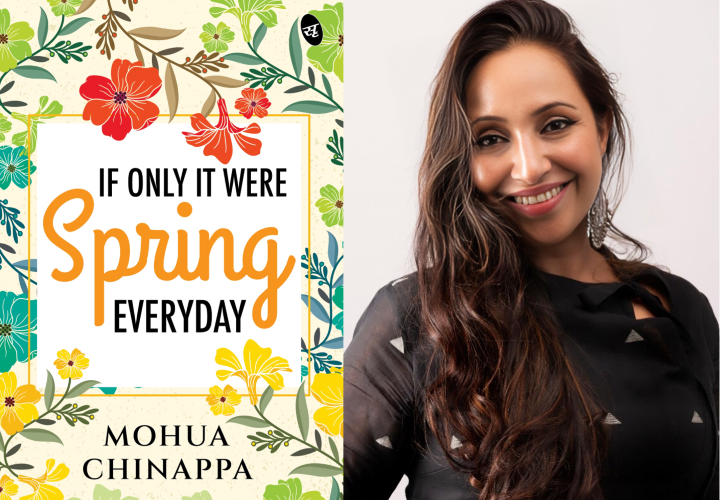Mohua Chinappa’s poems talk about fragility of life

Team L&M
Author and poet Mohua Chinappa is back with a collection of poems, If Only It Were Spring Everyday (Srishti Publishers), which is a heartfelt exploration of love, respect, and resilience in the face of adversity. In this collection, love is celebrated, and pain is felt deeply, reminding us of the fragility of the human experience. Through her words, Mohua invites readers to find solace amidst the storms of life and to embrace the hope that springs eternal, even in the darkest of times.
Following is an excerpt from the book:
27
SILENCE ON THE RAILWAY TRACKS
On 8 may 2020
In Aurangabad
The air was still,
It smelt
Of an eerie dance
Of the wolves.
The labourers
Could not foresee
The doom
Walked bravely
Into the jaws of death
As they were goaded
In search of security,
The walk that was never
To return ever again.
Such was this night
In the sleepy
And the sleepless
A long line of labourers
Waiting
For their death knell.
Most of us won’t understand
A hungry stomach
Or a back burnt
In the harsh noon sun.
Just like a happy person
Cannot understand a broken heart
That can never stop crying.
Many would say
Why did they stop
To sleep on the track?
The labourers
Were tired
Had trudged a long distance
Trying to escape
Death.
With the faith
Of god,
The band of the 16 labourers
Trudged the arduous path
Back home,
Withstanding the rain,
Shower the sun.
They carried
Their courage
With their little potli of rotis
A heart full of hope.
But luck
Was never their friend
Surely not on their side tonight.
They always lamented
That luck favours the rich
Strangely today
They had forgotten
That luck would not choose them again
It had already chosen
Its muse
In the prosperous
The chosen few.
It was already bad
That they had no work,
No food
The gnawing fear of death
Gripping their heart
Like the tentacles
Of a deadly snake
Each and every passing day.
They were alone in a city,
Without a name,
An identity
Or an address to call their own.
They decided to get together
Walk back home.
Back to the familiarity of family.
To their wives,
Little children,
old parents.
It was the ray of hope in the dark dungeon
Of the factory shifts.
They cooked rotis
Filled little cloth bags
Cooked food
They began their journey.
Labourers are a sturdy lot.
They can withstand
More trauma than others.
They trusted the strong
Legs to take them back.
With the experience
Of life,
The faith
In their two hands
Had already given them
Food hope of a better life.
They knew all they had was their body
To rely on
And a heart full of courage
And the innate knowledge
Of the survival tricks.
The factory owners Said,
“Please carry on.
We can’t help you anymore.”
Businesses
Were shutting shop
The pandemic was looming larger than life.
It was a few nights
Before the full moon.
They checked
The calendar,
Called their families
To tell them
That they were leaving their job
In the city
To return back home.
The wives were frightened
But were glad
That they would be together
Even
if it was in misery.
In this ruin,
Lies the story
Of Seema and Bholu.
Seema asked Bholu,
To add some achar
Between the rotis.
The dry
Sukkha rotis
Aren’t easy to swallow.
Bholu promised
To do that
And he said this would soon end.
He would be back at home.
Seema fasted
That morning.
It was the wee hours,
She woke up and prayed to the sun god
Applied her sindoor
Went round the tulsi tree
To beg forgiveness
For the fights to bring
Bholu safely back home.
Bholu joined the group and they began walking.
They walked
Till the back burnt
With the relentless sun
But they sang together
Kept the spirit intact.
They had not slept for days on end.
By the time dusk fell
They were losing track
The feet
Were giving away.
Sonu, the oldest among them Said,
“Let’s stay close to the track
So that we don’t lose
Our way.”
There is quarantine
No trains will pass
This way.
They decided
To rest a bit
They lay down,
Shut their eyes
Passed away.
Deep in slumber,
They didn’t hear the sound
Of the hungry wolves
The crushing
Of the train wheels
Speeding
Into the night track.
Bholu saw Seema in his dreams.
They were married
Only a few months ago.
They were expecting
Their first child.
He smiled
At the thought
Sang a tune, and slept away.
It was past midnight.
Like the train
From Pakistan,
This train was from the next village
In India.
The green flag
Was hoisted
The train took on its track.
It was pitch dark
The engine driver smiled
And started his journey
To Aurangabad ahead.
As he went blowing the whistle
In the air
Filling the air.
The train crushed bones,
Brains hearts
Under its wheels
It went on its journey
To deliver the goods ahead.
There was no sound
Because the death of the labourer
In the night, anyways is
Without much sound or mourning.
As the morning broke,
The villagers saw mutilated bodies,
Limbs,
Open boxes
With food and clothes
Strewn all around.
The army of the 16
Were gone
And there was one
Who survived Injured and maimed.
The cries filled the air
The dogs ate the rotis
In hope of filling their hunger
Human beings stood in shame
For the abject loss of humanity
Hung their heads with pain.
I too cried
Felt the bile rise in my throat,
I put the next morsel in my mouth.
I can see the rotis on the track
I silence my mind
I tell myself that
I will soon forget
Aurangabad train incident
Like I have forgotten
So many such incidents before.
Life is cheap
The poor is cheaper.
We shall continue.
But back in the village,
Seema is waiting
To see Bholu
She has no clue
That the only remains
Of her loving Bholu are
Mangled bones
Flesh
That she won’t ever know
If it’s her
Bholu or someone else.
The track lies strewn
With rotis,
Photos of family Screeching silence
That haunts me
Every evening
As I lie in my bed.
Train to Pakistan,
Train in Godhra,
Train in Aurangabad
All will remain
In the annals
Of history as an example
Of the abysmal loss
Of humanity
The lack of amenities
For the poor in our country.


